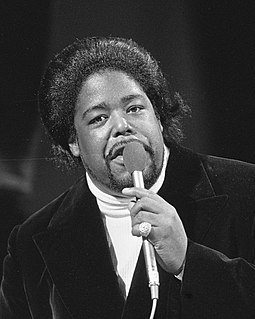A Quote by David Slade
When you are doing music videos through the '90s, which I did, and the 2000s, you were put in the position, really, as an independent filmmaker. You were being financed by a major record company or a minor record company or whatever.
Related Quotes
But I did mine through a production company. All the music I did, I gave to the production company. Then the production company would give the record company the album. I used to do all my albums like that. It was fantastic. But now, understand, I have never planned to do anything with these other tapes. The one that are released, like the Virgin Ubiquity you have there, I wasn't going to do anything with that music. One day, I was talking to this guy that owns BBE over in England, and I said I've got some tapes and stuff that you might be interested in, and he went berserk.
That was an idea of the record company, and also that was my first album after MCA and we wanted to come back with a strong album that would be noticed. If we put the vocals by very talented people and very meaningful songs, then the vocals would be a platform so that I could be noticed again. All of the MCA albums were just loaded with problems -- you know, the right musicians, the engineers. The record company would say 'You have to make music for black radio, you can't do what you have been doing with The Crusaders.' Everybody was telling me that was over, finished, done.
The first record was basically a quick, fast record. The second record, we were going for more of a poppier sound - like a heavy pop sound. For 'Rocket to Russia,' we'd sort of reached our pinnacle. We'd gotten really good at what we were doing, so that's like my favorite record - that's a really good record. It's just great from beginning to end.
My contract with mercury PolyGram Nashville was about to expire. And I never had really been happy. The company, the record company, just didn't put any promotion behind me. I think one album, maybe the last one I did, they pressed 500 copies. And I was just disgusted with it. And about that time that I got to feeling that way, Lou Robin, my manager, came to me and talked to me about a man called Rick Rubin that he had been talking to that wanted me to sign with his record company.
The company started in the early 90s or late 80s. We were a behavioural science company. We didn't pivot into data analytics till 2012. So, all the data that we collected pre-2012, which was done by the British company SBL group, was collected through quantitive and qualitative research on the ground.
The most common mistakes were investing in money market funds by people who were so scared at the prospect of managing their own funds that they picked the most conservative option, and their investments did not keep up with inflation. The second major mistake was being too heavily invested in their own company's stock, and buying when it was high and there was a lot of optimism about the company, and then having to sell it low when the company got in trouble.
I love the Bach Prelude No. 2 in C Minor and had that stuck in my head: why don't I put this on Imaginaryland? So I brought it to my friend Tom Grimley who recorded That Dog's first record. I played him all my a cappella pieces, and he said, "P, you should really make a record, it would be great! You can record it at my studio and I'll put it out!"





































